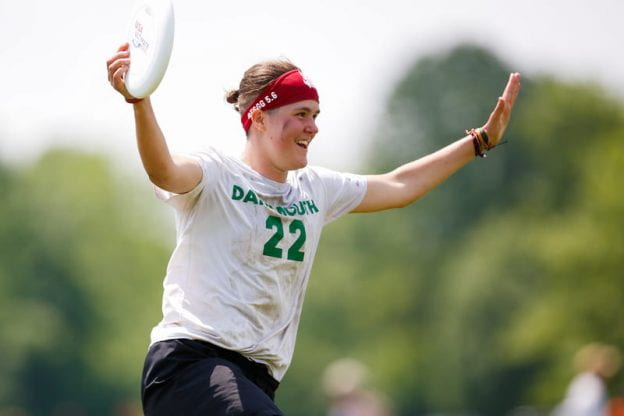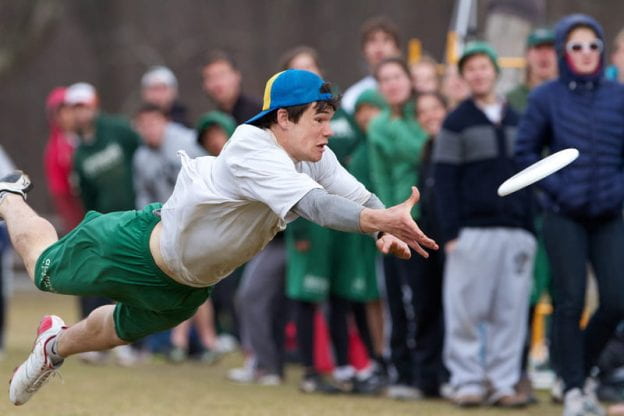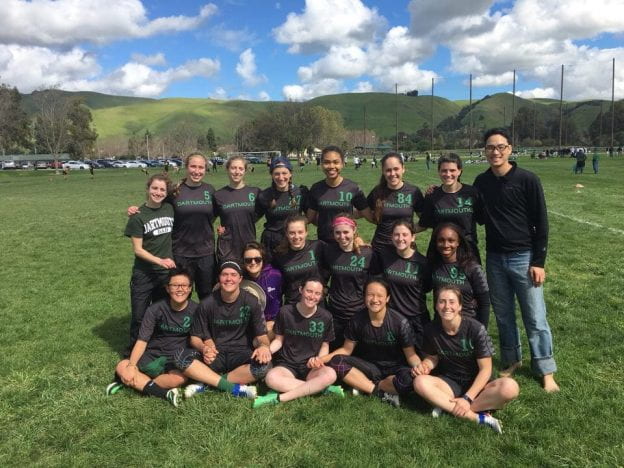GENERAL INFORMATION ABOUT THE ITEM:
- Customary Lore – Tradition
- Language: English
- Country of origin: United States
- Informant: Hannah Marr
- Date Collected: 11/16/19
INFORMANT DATA:
- Hannah Marr is a captain of the Dartmouth Womxn’s Utimate Frisbee Team, known as Dartmouth Daybreak. She has been on the team, previously known as Princess Layout, since her freshman year. Born on November 24, 1997, she is from Falmouth, Maine. Hannah is a member of the Dartmouth Class of 2020. She has been playing Frisbee since high school and continued to when she came to Dartmouth.
CONTEXTUAL DATA:
- Cultural Context: Frisbee Formal is an event that occurs during the winter term. Underclassmen must ask upperclassmen from a different team to formal in a creative way and send the formal invite to all of SPEW. In return the upperclassmen must respond in a similar fashion to all of SPEW. Frisbee formal is held at an undisclosed location where individuals chat and dance. A theme is announced ahead of time and people usually dress in “flair,” which is a colloquial term applied to fun, costume-like clothing, in accordance with the theme.
- Social Context: This interview was conducted off campus in person. Frisbee formal allows individuals an opportunity to meet players from other teams and socialize in a different environment and usual for frisbee. Often times underclassmen do not know the upperclassmen they ask to formal. Formal is also a time when the men’s and women’s teams are mixed together, even though they play seperately. Formal is a fun event where people socialize and meet other people in the program.
ITEM:
- Formal
TRANSCRIPT:
- “Frisbee formal is a really fun tradition that the frisbee program has. How it works is that underclassmen make really funny videos, whether it be a parody of a song, a dance that they’re doing or a little skit and they send the videos out via our listserv [SPEW] asking upperclassmen to the formal. Upperclassmen when they’re asked to respond with a similar fun video whether it be a song response or anything, and they’ll respond to the underclassmen. Everyone always says yes and it culminates with everyone going to a themed dance and where we all wear flair and dress up and have an awesome time. It’s a really great tradition that frisbee has. Frisbee formal is a really great way by which underclassmen get to feel comfortable around upperclassmen and the whole community gets to know each other better.”
INFORMANT’S COMMENTS:
- “I always look forward to seeing all the invites and responses that get sent out on SPEW!”
COLLECTOR’S COMMENTS:
- Frisbee formal can be seen as a form of a rite of passage because attendees are usually invited or have invited someone else to attend. The asking and response process is lengthy and often takes a lot of preparation. Additionally, at this event, it is likely that you will meet new individuals from other teams within the program, which could be interpreted as a part of incorporating new members into the community.
COLLECTOR’S NAME:
- Luke Cuomo & Annett Gawerc







